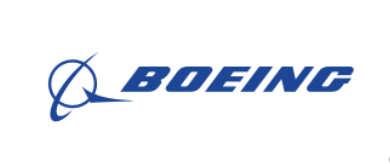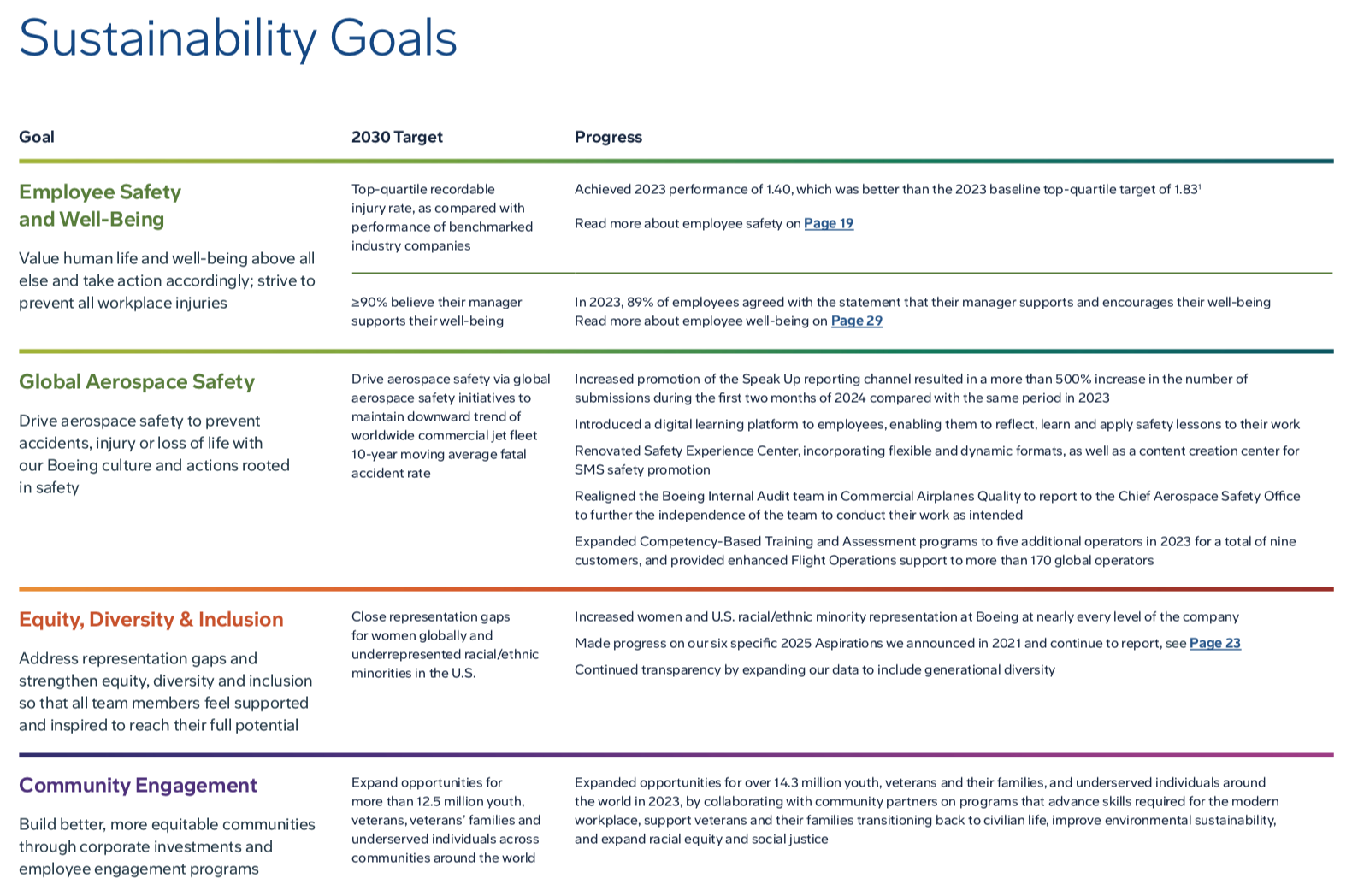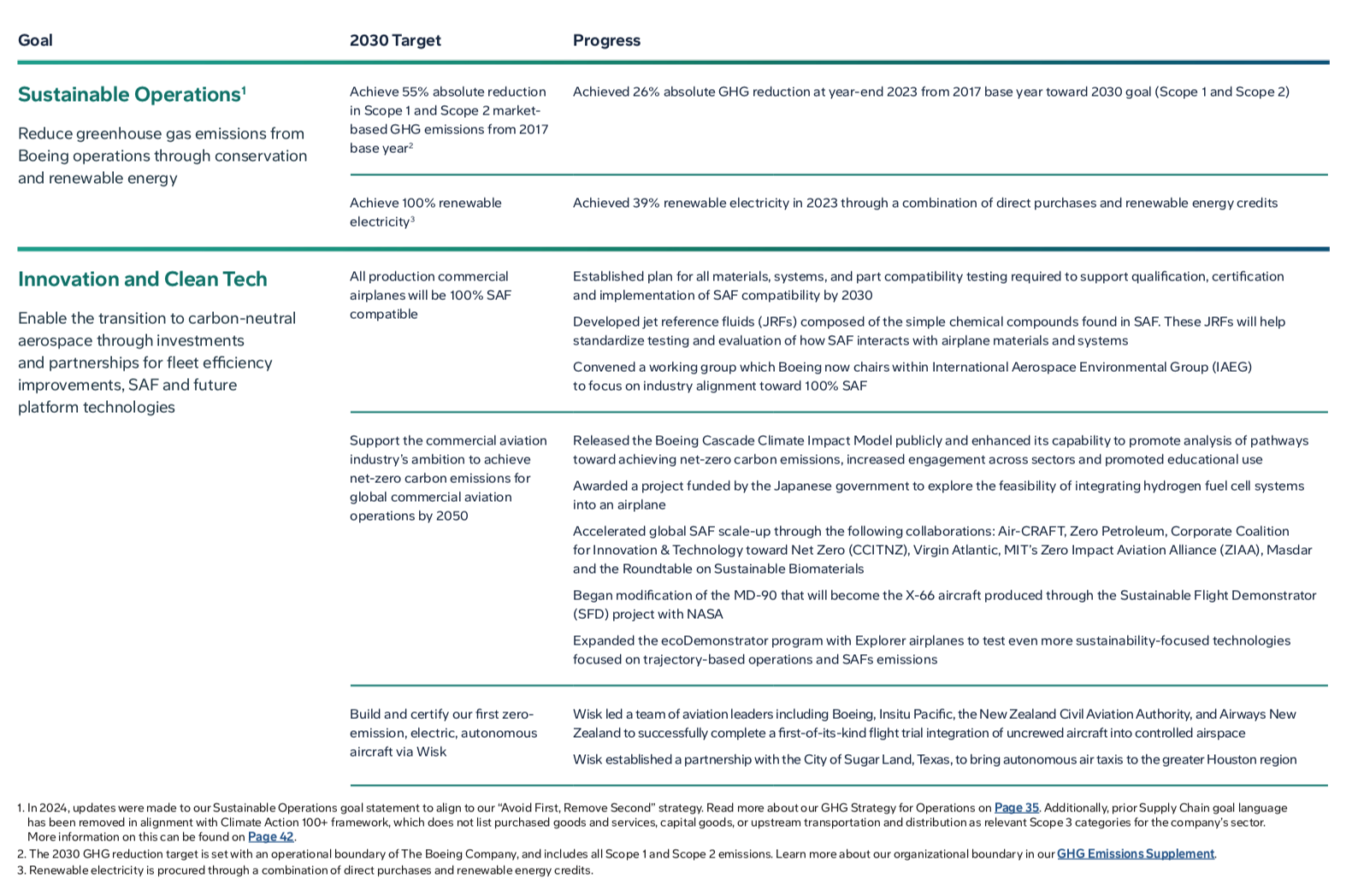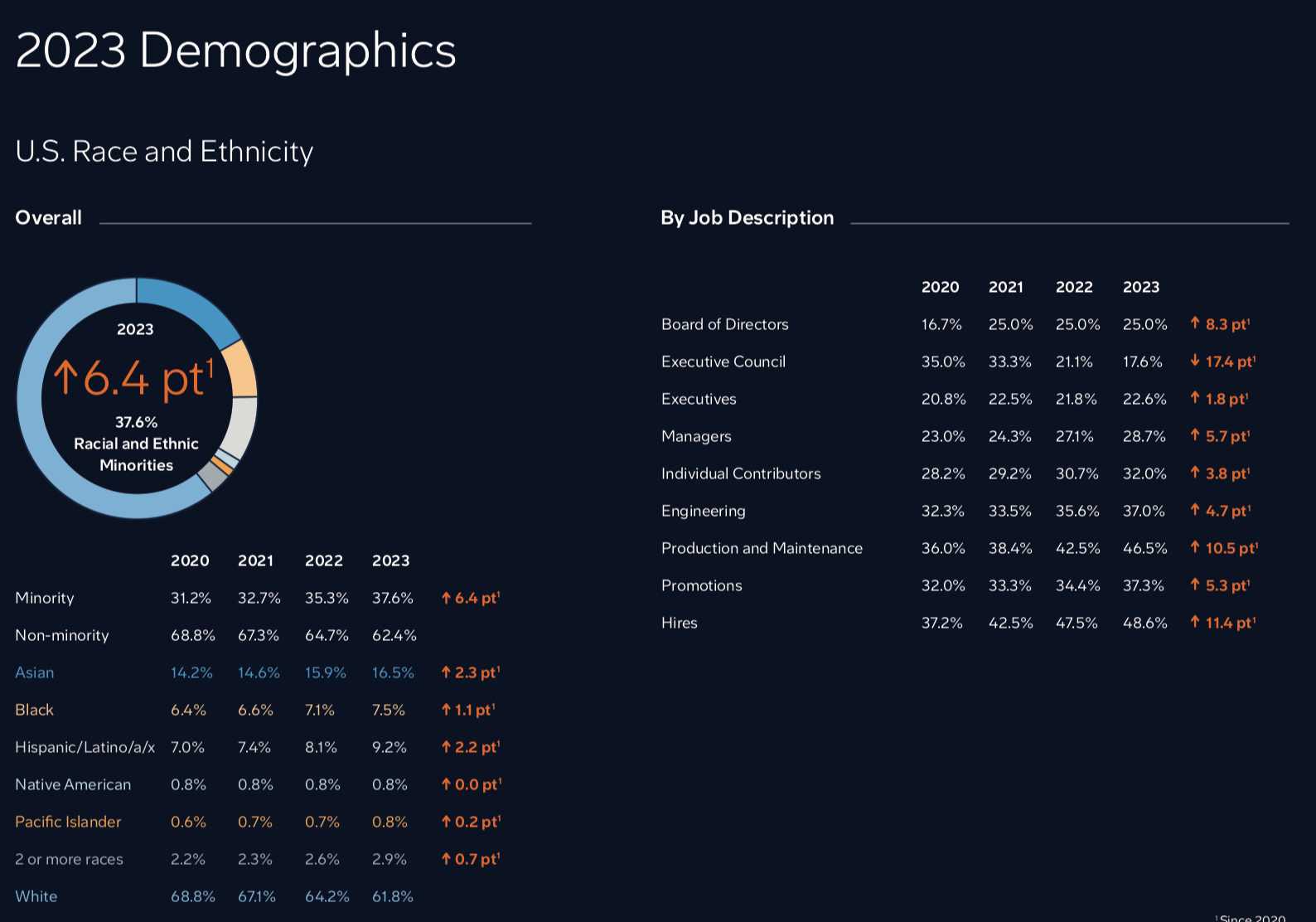CEF Lead Executives
-
BRIAN MORANItem Link
Chief Sustainability Officer
Brian is Responsible for advancing Boeing's sustainability efforts, focused on aerospace sustainability priorities, stakeholder-oriented reporting, industry-wide partnerships and company performance to achieve key sustainability goals. Brian previously served as vice president, Global Sustainability Policy & Partnerships for Boeing. Brian also held leadership roles in Boeing's commercial and defense businesses, in communications and in government affairs and has been based with the company in St. Louis, Washington DC, London, Seattle, Berlin, Brussels, Chicago and Amsterdam.
-
JILL GRAFTENREEDItem Link
Vice President, Sustainability Programs, Risk and Reporting
Jill partners across the enterprise to drive sustainability strategies, initiatives and goals to deliver on Boeing’s commitment to advance sustainable global operations. She and her team also lead enterprise sustainability reporting, risk management and disclosure, and engage internal and external stakeholders to understand the changing sustainability regulatory and governance landscape and benchmark best practices. Throughout her 20-year career with Boeing, Jill has held positions of increasing responsibility across the Finance, Program Management, Sales and Marketing and Strategy functions. Previous roles included Director of Strategy for Manufacturing and Supply Chain, Director of Strategic Analysis and Integration for Government Services within Boeing Global Services, and Senior Manager of Strategy for both BGS and Global Services and Support (GS&S) within Boeing Defense, Space and Security (BDS). Jill holds a Bachelor of Science degree in Business Administration - Marketing from Truman State University and earned her Master of Business Administration from Washington University in St. Louis.
-
ALEX CHAOItem Link
Senior Director, Enterprise Marketing
Alex is the Director for Enterprise Manufacturing. He’s also responsible for mechanic and technician training across Boeing Defense, Space, and Security. Previously, Alex was the Managing Director of Boeing Research & Technology - China based in Beijing. Since joining Boeing in 2005, Alex has held various management roles across 737, 787, the Everett Delivery Center, customer support, product development, operations and program management.Write a description for this list item and include information that will interest site visitors. For example, you may want to describe a team member's experience, what makes a product special, or a unique service that you offer.
-
PAUL SIMItem Link
Senior Director, Supply Chain
Paul is the senior director of Supply Chain Business Transformation and Integration. In this role, he supports the Supply Chain Process Council in driving functional excellence as well as delivering against functional Business Transformation commitments. Previously, Paul was the senior director for Supply Chain Contracts, Compliance, and Risk Management. Prior to moving into the supply chain function, Paul was senior counsel supporting Fleet Services (Fleet Care, Modifications, Conversions, AOG) within Boeing Commercial Aviation Services. Paul was also the responsible attorney for Boeing joint ventures in Washington State, Singapore and China. Previously, Paul was with the Global Law Affairs group of the Boeing Law Department as UK counsel. Before joining Boeing in 2012, Paul practiced law at Eversheds LLP and spent time working in the firm’s London, Shanghai and Hong Kong offices.
-
JEFF DOANItem Link
Director, Conservation & Engagement
Jeff is the Director for Conservation and Engagement for Boeing within the Global Environmental Sustainability organization – a position to which he was appointed in June 2022. He is responsible for overseeing utility services for Boeing’s domestic sites as well as implementing strategies for sustainable behaviors that support short- and long-term company goals for emissions, energy, water and waste. Jeff has over 11-years of experience at Boeing in a number of leadership and program management roles within Facilities and Asset Management throughout the Puget Sound. His career started at Boeing as an intern with Planning and Real Estate in 2010. Jeff’s education includes a Master’s degree in Engineering & Techlogy Management from Washington State University, a Corporate Sustainability Certificate from Cornell and IFMA’s Sustainable Facilities Professional designation.
-
MATTHEW TAYLORItem Link
Director, & Chief Engineer, Facilities Engineering
Matthew is the Executive Director for Value Stream Integration, Facilities Engineering, and Techlogy for Global Real Estate and Facilities, within Enterprise Services at Boeing. He is responsible for business and digital transformation efforts within the function, and serves as Chief Engineer for Facilities Engineering with a focus on overall asset management and sustainable buildings and infrastructure. Matthew has over 10 years of experience at Boeing in a variety of leadership roles across multiple sites and programs. He currently lives in Charleston, South Carolina. Matthew’s education includes a bachelor’s degree in Mechanical Engineering from Seattle University, a master’s degree in Strategy, Management, and Leadership from Michigan State University, and other graduate level certificates in project management.
-
WADE STRANGEItem Link
Senior Manager, Environment
Wade's team is responsible for managing several environmental programs for the company including employee engagement/behavior, ISO 14001 EMS, environmental conservation/ sustainability, and environmental data systems. Prior to working at Boeing’s corporate EHS office, he was an environmental engineering manager at Boeing’s commercial airplane final assembly site in Everett, WA and an environmental engineer at Boeing’s fabrication site in Auburn, WA.
Latest Sustainability Reporting
2024 Sustainability & Social Impact Report
(July 2024)
Highlights
- Achieved a 26% absolute Scope 1 and 2 emissions reduction at year-end 2023(2017 baseline).
- Increased renewable electricity procurement by 16% in 2023, reaching 39% renewable electricity across the company through direct purchases and renewable energy credits.
- Reduced solid waste to landfill by 28.6% and hazardous waste by 24.9% (2017 baselines).
- Convened and currently chairs a working group within International Aerospace Environmental Group (IAEG) to focus on industry alignment toward 100% sustainable aviation fuel (SAF).
- Placed agreements to purchase 5.6 million gallons of blended SAF to support its U.S. commercial operations in 2023.
- In 2023, collaborated with the air navigation service providers of Japan, Singapore, Thailand and the U.S. to demonstrate how coordinating navigation across global airspace jurisdictions to optimize flight paths can improve operational efficiency.
- Increased women and U.S. racial/ethnic minority representation at nearly every level of the company.
- Spent $5.4 billion with 5,100 diverse and small business suppliers in 2023.
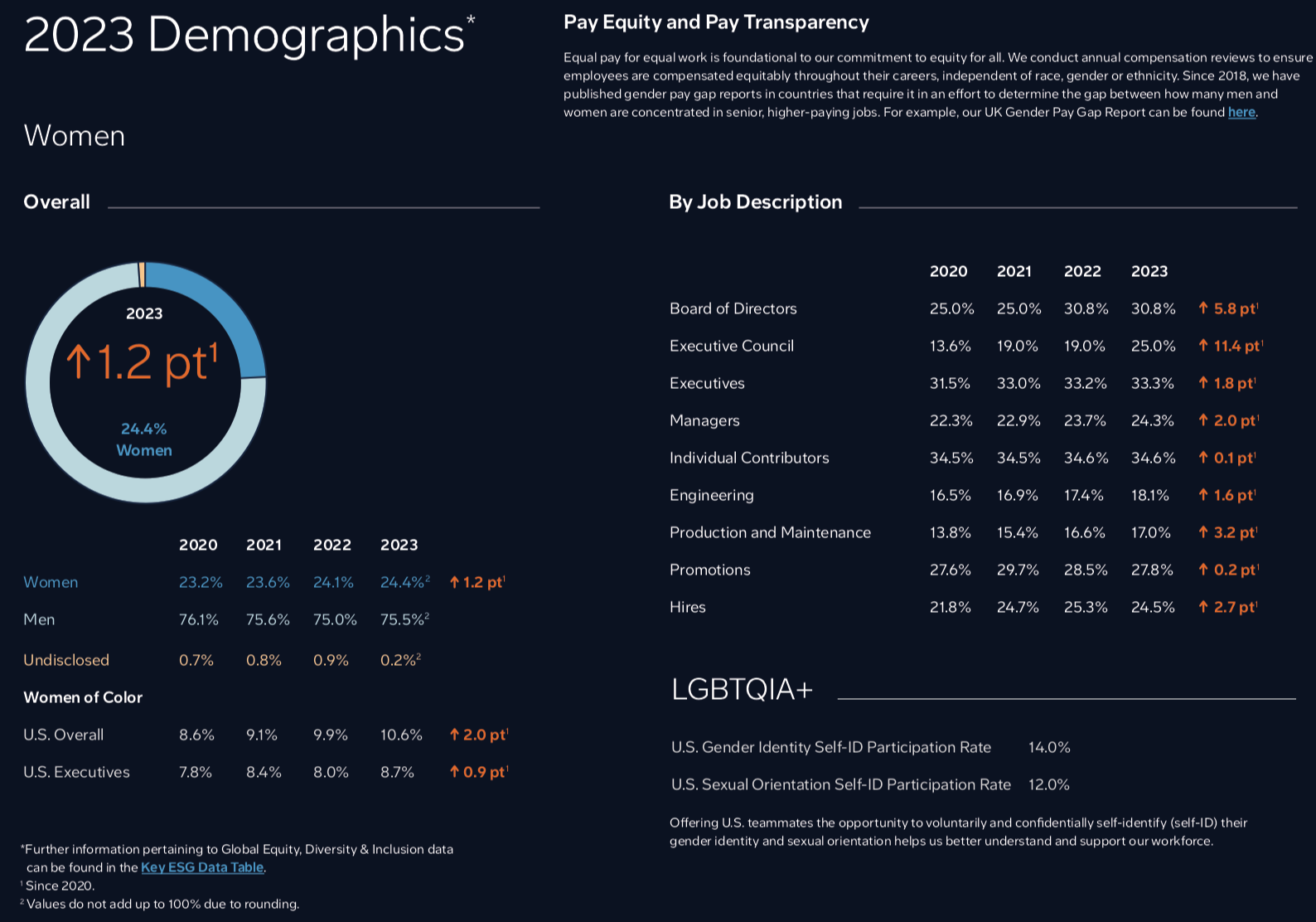
Recent News
2024
Beyond Target 15: Aligning Corporate Nature Actions to the Global Biodiversity Framework (Wildlife Habitat Council (WHC)) — Explores ways companies can address biodiversity loss beyond assessing, disclosing and reducing their biodiversity-related risks and impacts (Target 15 of the Global Biodiversity Framework (GBF)). The paper illustrates on-the-ground corporate conservation actions and how they align with various targets of the GBF, including habitat restoration; protecting species of concern; using biological controls to reduce invasive species; and strengthening community partnerships. It includes case studies by CEF Members Boeing, General Motors, and WM. (Nov 2024)
SAF Coalition — Aims to rapidly scale investment in the sustainable aviation fuel (SAF) sector and advocate for the incentives and policies necessary to expand SAF supply and promote U.S. economic competitiveness in the SAF marketplace. The coalition consists of 41 companies and organizations that hold a stake in the development and deployment of SAF, including CEF Members The Boeing Company, GE Aerospace, and United Airlines. (May 2024)
2023
Open Emissions Database (Climate TRACE) — This new inventory provides independently produced estimates of nearly every major source of greenhouse gas emissions around the world, including facilities like power plants and steel mills, as well as fertilizer application, deforestation, and wildfires. The expanded database tracks emissions from more than 352 million assets, 4,400 times increase compared to the assets covered by the inventory last year. CEF members Boeing and General Motors, among others, are collaborating with Climate TRACE to leverage the database in decision-making processes to help drive decarbonization. (Dec 2023)
Airports of Tomorrow — This initiative, launched by World Economic Forum with Airports Council International, aims to overhaul global airports to enable net-zero aviation. It brings together more than 50 CEOs from “the aviation ecosystem” to mobilize capital needed to transform airports into clean energy hubs, electrify airport operations, and scale up at least 300 Sustainable Aviation Fuel plants by 2030. CEF members include Bank of America, Boeing, Honeywell, and McKinsey & Co. (July 2023)
EQUATIC — This carbon removal company announced a pre-purchase option agreement with Boeing for the removal of 62,000 metric tons of CO2 along with the delivery of 2,100 metric tons of “carbon-negative” hydrogen to Boeing. The company, which emerged out of UCLA, electrolyzes seawater (producing hydrogen) and passes atmospheric CO2 through the processed seawater to trap CO2 in solid materials. (June 2023)
Cascade Climate Impact Model (Boeing) — Boeing released this new data modeling tool to identify the effects of a range of sustainability solutions to reduce aviation's carbon emissions. Cascade examines the full life cycle of alternate energy sources for aviation (from production through distribution and use) and quantifies the ability to cut aviation's carbon emissions. Data modeling also measures airplane fleet renewal, operational efficiency, renewable energy sources, future aircraft and market-based measures as pathways to decarbonization. Findings from Cascade reveal the importance of: sustainable aviation fuels for the current fleet; minimizing emissions regardless of energy source; the limits of electric- and hydrogen-powered aircrafts through 2050; and the importance of fleet renewal in the coming years. (May 2023)
The United Airlines Ventures Sustainable Flights Fund — United Airlines, along with five corporate partners, launched this first-of-its-kind investment vehicle to support start-ups focused on accelerating the research, production, and technologies associated with Sustainable Aviation Fuel (SAF). The fund starts with more than $100 million in investments from United and its inaugural partners: Air Canada and CEF Members Boeing, GE Aerospace (GE), JPMorgan Chase, and Honeywell. Customers can also donate to the fund when buying a ticket (with the first 10,000 receiving 500 United Miles). (Feb 2023)
Announced it will purchase 5.6 million gallons (21.2 million liters) of sustainable aviation fuel (SAF) to support its operations through 2023. This is more than double Boeing’s procurement from 2022 and makes up 25% of Boeing’s total jet fuel needs for the past year. (Feb 2023)
Community-First Environmental Action (Wildlife Habitat Council (WHC)) — This white paper discusses how corporations across the world are interfacing with surrounding communities on issues related to sustainability, conservation and education. It explores opportunities for minimizing unavoidable impacts, rectifying impacts, repairing relationships and creating new approaches for working in and with host communities. It details key steps in community-first environmental action, including effective community engagement, knowledge exchange, and long-term connection, and provides case studies of several WHC-certified programs exemplifying these actions (including from CEF members Boeing, Dow, General Motors, and WM). (Jan 2023)
NASA issued an award to Boeing for the agency’s Sustainable Flight Demonstrator project, which seeks to inform a potential new generation of green single-aisle airliners. NASA will invest $425 million, along with $725 million from Boeing and partners, to build, test, and fly a full-scale Transonic Truss-Braced Wing demonstrator aircraft and validate technologies aimed at lowering emissions. This is an aircraft with extra-long, thin wings, stabilized by diagonal struts, that create less drag and thus burns less fuel. Combined with other advancements, this could reduce fuel consumption and emissions by up to 30%. (Jan 2023)
2022
Contrail Impact Task Force — Brings together major airlines, aircraft makers, and leading contrail researchers to explore opportunities to address the warming impacts of certain contrails. Specifically the task force aims to share and expand the latest science on the impact of contrails; develop actionable strategies to avoid warming contrails; analyze the operational and financial challenges of implementing potential solutions; and establish a roadmap for implementation and validation of mitigation tools. CEF members Boeing and Google (Google Research) are involved. (Nov 2022)
Announced two new collaborations, with Alder Fuels and MIT, respectively, to accelerate progress toward the civil aviation industry’s commitment to net-zero carbon emissions by 2050. The aircraft manufacturer will support testing and qualification of Alder's "greencrude"-derived sustainable aviation fuel (SAF) to spur much-needed growth in SAF availability. The partnership with MIT is a three-year evaluation project called Pathways to Sustainable Aviation, which will explore "technical and economic factors that contribute to a more sustainable aerospace future." It will make use of Boeing's new Cascade data modeling tool that quantifies the emission-reducing power of various implementation scenarios. (July 2022)
theSKIMM — Mission-driven media company theSkimm created a public-facing database featuring voluntarily-shared leave policies of more than 480 companies, in an effort to increase transparency and provide accessible information from a wide range of employers to help empower workers and improve policies. The database builds on theSkimm’s viral #ShowUsYourLeave initiative (launched in 2021) and presents market research as well as specific company benefits and policies. Among the companies that shared their policies are CEF members Bank of America, Boeing, Cisco, General Motors, and Morgan Stanley. (April 2022)
Signed an agreement to buy 2 million gallons of EPIC Fuels’ blended sustainable aviation fuel (SAF) made from inedible agricultural waste—the largest announced SAF procurement by an airframer. The SAF will power Boeing’s Commercial Airplanes operations in Washington state and South Carolina through 2022, and EPIC Fuels will also continue supplying custom blends of 50-100% SAF for the Boeing ecoDemonstrator program. (Feb 2022)
Is investing $450 million in Wisk Aero to accelerate the development of the “first-ever candidate for the certification of an autonomous, all-electric, passenger-carrying aircraft in the U.S.” (Jan 2022)
2021
UNITED AIRLINES — Completed the world’s first passenger flight powered by 100% sustainable aviation fuel (SAF). The fuel is “drop-in ready” and compatible with existing aircraft fleets, and the flight was operated in partnership with CEF member Boeing, CFM International (a GE Aviation and Safran Aircraft Engines joint venture), Virent, and World Energy. (Dec 2021)
The US State Department, through Special Presidential Envoy for Climate
John Kerry, and the
World Economic Forum
launched the
First Movers Coalition,
a
public-private partnership to accelerate green technologies’ commercial viability and decarbonize 8 hard-to-abate sectors by 2030. The
32 founding corporate signatories, accounting for over $8 trillion in market capitalization,
will sign purchasing commitments tailored to create market demand for the technologies. CEF members
Amazon, Apple, Bank of America, Boeing,
and
Trane Technologies are signatories.
Breakthrough Energy is the Primary Implementation Partner. (Nov 2021)
MORE »
MORE 2 »
60 COMPANIES’ 2030 SUSTAINABLE AVIATION FUEL (SAF) TARGET —
60 companies in the WEF’s
Clean Skies for Tomorrow Coalition, which aims to accelerate global deployment of SAF, committed to “accelerating the supply and use of SAF technologies to reach 10% of global jet aviation fuel supply by 2030.” Signatories of the
2030 Ambition Statement
include CEF members
Bank of America, Boeing, Honeywell,
and
McKinsey & Co. (Oct 2021)
MORE »
Taskforce on Scaling Voluntary Carbon Markets (TSVCM)
— The taskforce has formed an
independent Board of Directors to govern voluntary carbon markets, with
22 members
representing 12 countries (40% in the Global South); the NGO, academic, corporate, and financial sectors; Indigenous people; and local communities.
The Board will be supported by TSVCM’s founding sponsors, an Executive Secretariat, an Expert Panel, a Senior Advisory Council, and a
Member
consultation group of 250 organizations (including CEF members
Bank of America, BlackRock, BloombergNEF, Bloomberg Philanthropies, Boeing, Chevron, Delta, Google, JPMorgan Chase & Co., Microsoft, Morgan Stanley, Siemens,
and Unilever). (Sept 2021)
MORE »
MORE 2 »
Aviation Impact Accelerator (AIA) — A new Cambridge University-led, international group of aerospace, climate science, economics, and policy experts was formed to
build a simulator that will support the aviation sector’s transition to net-zero flights by 2050.
The interactive, evidence-based simulator will explore a range of
future scenarios for achieving the transition, calculating the climate impact, resource requirements, and the cost of flying. Backed by HRH The Prince of Wales’ Sustainable Markets Initiative and The World Economic Forum, corporate advisors include Boeing, BP, Heathrow, Rolls-Royce,
and
Siemens Energy. (Aug 2021)
MORE »
Target True Zero initiative —
A new World Economic Forum initiative was launched to accelerate zero-emissions aviation by leveraging hydrogen and electric flight technologies.
The initiative will examine the technologies’ readiness, total cost of ownership, and infrastructure requirements and
create a roadmap for industry transition, to be released at COP26. The 16 aviation partners involved include
Boeing, Rolls-Royce, and
Wright Electric, with
McKinsey & Co.
as a knowledge partner. (Aug 2021)
MORE »
TPG —
Announced a
first close of $5.4 billion for the TPG Rise Climate Fund, the largest climate-focused fund in the world. Over
20 global companies—including CEF members
3M, ADM,
Alphabet, Apple,
Bank of America, Boeing, Dow, GE, General Motors, Honeywell,
and
TD Bank Group—participated in the close and will form a
Rise Climate Coalition. The fund will take a broad sector approach, focusing on growth equity to value-added infrastructure to
driving solutions for 5 climate sub-sectors. (Aug 2021)
MORE »
Announced a partnership
with
SkyNRG, which sources, blends, and distributes sustainable aviation fuel (SAF), and SkyNRG Americas
to scale SAF globally. Boeing will invest in SkyNRG Americas’ first U.S. SAF production facility. (July 2021)
MORE »
Sustainable Aviation Buyers Alliance — The alliance of companies, spearheaded by
RMI
and the
Environmental Defense Fund,
will
pilot a sustainable aviation fuel certificate (SAFc) this year, created to enable air transport customers to invest in high-quality SAF. The companies—Boston Consulting Group, Boeing, Deloitte, JPMorgan Chase, Microsoft, Netflix,
and Salesforce—will share takeaways and insights to be put in a future usage guide. (July 2021)
MORE »
Announced a partnership with Alaska Airlines to test about 20 technologies through its
ecoDemonstrator program to make air travel safer and more sustainable.
Technologies include a new fire extinguishing agent to significantly reduce effects on the ozone layer and cabin sidewalls made from recycled airplane wing materials. (June 2021)
MORE »
Democrat lawmakers introduced the “Sustainable Skies Act” to create a tax credit for sustainable aviation fuel (SAF) production—up to $2 per gallon—through 2031. A coalition of over 50 groups and businesses—including Boeing, FedEx, JetBlue, and UPS—sent a letter to lawmakers supporting the bill, which applies to SAFs offering at least a 50% reduction in GHG emissions compared to conventional fuels. (May 2021)
Sustainable Aviation Buyers Alliance
(SABA)
—
A new alliance launched by RMI and Environmental Defense Fund to accelerate aviation decarbonization by driving investment in sustainable aviation fuel (SAF), catalyzing new SAF production and technological innovation, and supporting member engagement in policy-making. Founding companies involved include
Boeing, BCG, Deloitte, JPMorgan Chase, Microsoft, Netflix,
and Salesforce.
(April 2021)
MORE »
MIT partnered with 13 companies to launch the MIT Climate and Sustainability Consortium (MCSC), which will co-create and accelerate shared innovation solutions that address climate change. Inaugural member companies include Accenture, Apple, Boeing, Cargill, Dow, IBM, Inditex, LafargeHolcim, MathWorks, Nexplore, Rand-Whitney Containerboard (a Kraft Group Company), PepsiCo, and Verizon. (February 2021)
The Taskforce on Scaling Voluntary Carbon Markets sponsored by the Institute of International Finance established core carbon market principles and released a roadmap of 20 comprehensive actions to scale the carbon offset market. The taskforce includes governments, NGOs, and businesses, including Bank of America, BlackRock, BloombergNEF, Boeing, Siemens, and Unilever. (January 2021)
Boeing announced a new goal to begin delivering commercial airplanes capable of flying on 100% biofuel by 2030. (January 2021)
2020
Boeing has appointed Chris Raymond as the company’s first Chief Sustainability Officer. (September 2020)
Boeing received a 2020 Sustainability Leadership Award from the National Association of Manufacturers for its aerospace carbon fiber recycling program. (August 2020)
Winner of the 2020 ENERGY STAR Awards, which recognize organizations for developing energy efficient products and services that help customers save money and energy. (April 2020)
Members of the UK Sustainable Aviation coalition — including Airbus, Boeing, British Airways, and Rolls Royce — have backed a plan to achieve net-zero emissions in the UK aviation industry by 2050. (Feb 2020)
How can we help? Please reach out to us!
Laura Keenan, Chair
laura@corporateecoforum.com | (617) 921-2307
Amy O’Meara, Executive Director
amy@corporateecoforum.com | (857) 222-8270
Mike Rama, Deputy Director
mike@corporateecoforum.com | (607) 287-9236
Margaret Zamoyta, Program Lead
margaret@corporateecoforum.com I (917) 678-4161
MR Rangaswami, Founder

